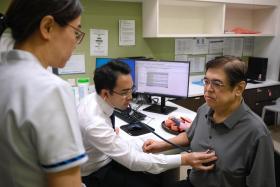Upgrade of home, centre-based services needed: Study
Study says areas for improvement include funding, capacity and affordability
An upgrade of home and centre-based care services in Singapore is needed as more seniors are being cared for outside of hospitals and nursing homes in fast-ageing Singapore, a Lien Foundation study on long-term care services revealed.
Citing Ministry of Health (MOH) figures, the study said around 14,000 people used subsidised home and centre-based services late last year, up from 12,000 the year before.
In contrast, the number of subsidised nursing home residents has remained stable at around 10,000 over the past two years, signalling a shift in the main mode of long-term care for seniors.
As the Singapore population is rapidly ageing, more needs to be done to help seniors age in place, the study concluded.
It highlighted areas such as funding, capacity, affordability, manpower and regulation as key areas of focus.
The number of people in Singapore aged 65 and above crossed the half a million mark last year and is set to double by 2030.
"This is a study that impacts every one of us... If we want to be sustainable as an ageing society and age healthily and happily, we actually need to put in the steps now rather than wait for the demographic explosion to take place," said National University of Singapore (NUS) Associate Professor Elaine Ho at a media briefing yesterday.
If we want to be sustainable as an ageing society and age healthily and happily, we actually need to put in the steps now rather than wait for the demographic explosion to take placeNUS Associate Professor Elaine Ho
She co-authored the study with NUS Associate Professor Shirlena Huang.
Both are from the Social Science Research Centre at the Department of Geography.
The study sought feedback from 103 individuals, including interviews with 50 non-profit and private care provider representatives, government representatives, experts in the field of ageing as well as caregivers.
They found that despite the increase in demand for home and centre-based care, only 2.5 per cent of Singapore's $9.8 billion healthcare budget, or $240 million, was spent on such care in 2016 - the latest year for which figures are available.
And despite a substantial rise in long-term care spending by MOH in recent years - $800 million in 2016, up $200 million from 2015 - the spending amounted to only 8 per cent of the healthcare budget and 0.19 per cent of Singapore's gross domestic product for the year.
In comparison, advanced nations from the Organisation for Economic Cooperation and Development spent an average of 1.4 per cent of their GDP on long-term care in 2014.
The study acknowledged that home and centre-based capacity has more than doubled in recent years. There were 13,000 places last year, up from 5,900 in 2011. Another 3,200 places will be added by 2020.
Yet, the report found some evidence that capacity may still be falling short of need.
For instance, the Agency for Integrated Care, which coordinates Singapore's long-term care services, received 7,800 referrals for day care services in 2015, when only 3,500 day care places were available.
There were 5,000 places available last year, but this still fell short of the 2015 demand, and the need has likely increased since then.
Cost is also a concern.
While the vast majority of people want to age and be cared for in the comfort of their own homes rather than in institutions, the costs of community care can be considerable, the report found.
A family looking after a severely disabled senior at home could pay up to $3,100 a month, including transport and consumables before subsidies.
This is higher than the median full cost of $2,400 for looking after the same person in a nursing home run by a voluntary welfare organisation.
Singapore has enough capacity currently to meet demand for aged care
Singapore has sufficient capacity currently to meet demand for aged care, the Ministry of Health (MOH) said in a statement yesterday. But it will continue to grow services to cater to a greying nation.
In response to a Lien Foundation report which said the Government has not provided enough facilities or subsidies for the rapidly ageing population, the MOH said it is "on track to meeting our targets of 6,200 day care places, 10,000 home care places and 17,000 nursing home beds by 2020".
The report gave the example of how referrals for day care at one centre outnumber actual places. It also cited how the median waiting time for general day care is about 20 days while that for dementia care is about 35 days.
MOH added that, since 2015, it has had service guidelines as a reference for all service providers so they can "work towards delivering good quality care for seniors". It also carries out service audits to ensure this.
The ministry is reviewing the need for more formal regulation under the upcoming Healthcare Services Act with a risk-based approach "so that the provision of safe and good quality service does not add excessively to regulatory costs for providers, and consequently raise the cost of care for seniors".
The Lien report, released yesterday, stressed the importance of preventive care, citing how a rapidly greying Singapore could see the number of people aged 65 years and older doubling to a million by 2030. This is 100,000 more than the government estimate.
In its statement, the MOH said the Community Network for Seniors (CNS), which involves government bodies, voluntary welfare organisations and volunteers teaming up to visit seniors, was set up to help seniors age in place.
The Lien study pointed out that while the majority of people want to age and be cared for in the comfort of their own homes, rather than in institutions, the costs of community care can be considerable.
Get The New Paper on your phone with the free TNP app. Download from the Apple App Store or Google Play Store now


